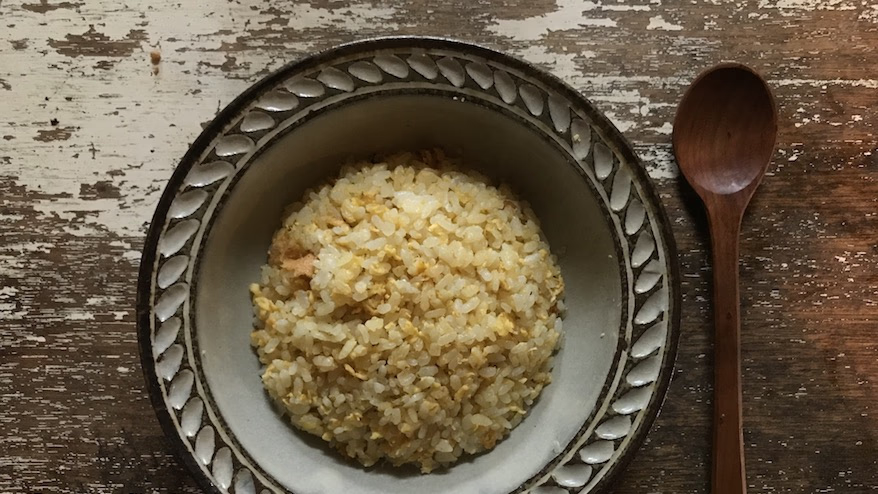先日、子供たちの昼ごはんに玉子チャーハンを作った。
素材は、米、卵、玉ねぎ、塩、太白胡麻油、以上。(質素…)
これがコンビニで買った玉子チャーハンだったとしよう。
お米は、おそらく外国産、卵はどこのものかわからないし、入っている玉ねぎも同様だろう。塩、油に加えて、名前が理解できないカタカナ表記の添加物がたくさん列挙されている。そして器は、プラスチックの(おそらく黒い)容器で、白いプラのスプーンが横におかれていることになる。更に、その横には、買い物袋とチャーハンが包まれていたラップなどのゴミが置かれているだろう。
前に読んだ、美大の先生(確か)のエッセイで、食べるということは、「振る舞いの連続」であると書いてあった。食材を調達し、調理し、器にもりつけ、食べて、食器を洗い、片付ける。コンビニで弁当を買って食べているのを見ていると、半分くらい食べ進んだころから、ゴミを漁って食べているように見えると。自分もコンビニで弁当を買って食べた後のゴミの多さにいつもゲンナリしていた。
話を、写真の玉子チャーハンにもどそう。
お米は、妻の実家の新潟で育てられたもの。卵は、徳島のたむらの卵。玉ねぎは、うちの農業チームのちえちゃんが育てたもの。塩は、高知の海の天然塩「あまみ」のもの。器は、熊本の小代焼ふもと窯 井上尚之さんのもの。木のスプーンは、高知四万十の荒井智哉さんのものである。器と木のスプーンは、知り合いのお店で買ったもので、残念ながらまだ作家さんにはお会いしたことはないので、いつかお会いしたい。
この玉子チャーハンを、腹ペコの子どもたちを前に、私が「あーでもない、こーでもない」と言いながら作る。子供たちは「味がうすい」とぶつぶつ言いながらぺろりとたいらげ、食器を片付けろと言われ、流しに運ぶ。この「食べる」をとりまく一連の行為は、ほぼ毎日、必ず繰り返される。
この毎日の振る舞いの連続が、どこまでの広がりを持ち、
「何」に「どう」影響し、社会にフィードバックされていくのかを想像する。
何が言いたいかというと、「食べる」という生きている限り永遠に続くであろう振る舞いの連続性が「丁寧に」繰り返されると、ものごとや人、地域へ「愛着」を育てるのではないか。そして、巡り巡って、その土地の「経済」にも大きく影響を与える。
玉子チャーハンと「愛着」と「経済」。
そんなことを「里山資本主義」的な(途中までしか読んでない…汗)食の経済論として誰か研究してくれないかと、最近本気で思っている(自分でやれ?)。
